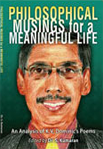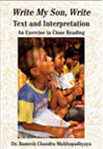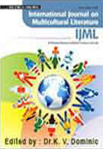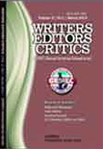Details of Critical study
My Article on Nissim Ezekiel
Year Of Publish:
Nissim Ezekiel: The Father of Modernity in Indian-English Poetry
Nissim Ezekiel is acclaimed as the father of post-independence Indian-English verse. He is a trend-setter, who started modernity in Indian-English poetry. A horde of contemporary Indian-English poets follow the simple, conversational style of Ezekiel. Not only in the style but also in the selection of themes one finds the influence of Ezekiel in the contemporary Indian-English poets.
Poet, dramatist, editor, art-critic, Nissim Ezekiel was born on 14 December 1924 in Mumbai. His father, Moses Ezekiel, was a professor of Botany at Wilson College, and his mother was Principal of her own school. The Ezekiels belonged to Mumbai’s Jewish community, known as the ‘Bene Israel.’ In 1947 Ezekiel took his MA in English Literature from Mumbai University. Then he studied philosophy at Birbeck College, London. He married Daisy Jacob in 1952 and the same year his first collection of poems titled A Time to Change was published by Fortune Press (London). Returning home Ezekiel joined The Illustrated Weekly of India as an assistant editor in 1953 and stayed there for two years. He published his second book of verse Sixty Poems the same year. He also worked as a broadcaster on arts and literature for All India Radio. Prof. Ezekiel was the head of the Department of English in Mithibai College, Mumbai from 1961 to 1972. He rendered his service as visiting professor at University of Leeds (1964) and University of Chicago (1967).
Ezekiel’s poetic collections include: Time to Change (1952), Sixty Poems(1953), The Third (1959), The Unfinished Man (1960), The Exact Name (1965), Snakeskin and Other Poems (1974), Hymns in Darkness (1976), Latter-Day Psalms (1982), and Collected Poems 1952-88 (1989).
Among the honours Ezekiel received are: the Sahitya Akademi award in 1983 and the Padma Shri in 1988. He was Professor of English at University of Mumbai during the 1990s. He acted as the Secretary of the Indian branch of the PEN. After a prolonged battle with Alzheimer’s disease, Nissim Ezekiel died in Mumbai, on 9 January 2004.
The major themes of Ezekiel are: love, loneliness, lust, creativity and political pomposity, human foibles and the “kindred clamour” of urban dissonance. As the poetic muse of Ezekiel flew higher and higher in the course of years, his attitude also changed. The young man who went after dreams, demanded truth and lambasted corruption. After 1965, he even began embracing India’s English vernacular, and teased its idiosyncrasies in Poster Poems and in The Professor.
It is Mahatma Gandhi who brought out simplicity and clarity into the modern Indian-English prose as against the complex, hard and elite language of Macaulay English. Similarly it is Ezekiel who made Indian-English poetry digestible for the common man. He is “averse to obscurity in modern poetry. As he puts it:
Attacks on obscurity in poetry are generally dismissed as anti-intellectualist. But there still remains a case against always giving obscurity and difficulty the benefit of the doubt on the ground that some profound truths can be expressed in no other way. Too many poets in the twentieth century offer only the difficulty and not the profundity, though it is not considered respectable in literary circles to say so.
Modern writers have a tendency to justify the complexity of their writing on the ground that modern life is complex. However, the complexity can be presented in deceptively simple form, as sometimes the profoundest philosophical truths are presented. (qtd. in Ramakrishna 27)
Ezekiel wants simplicity of thought and language in modern poetry. He extends the concept of simplicity to form in poetry. “In rhythm, he would aim at “the natural, the flowing, the direct and the informal or conversational”” (Ramakrishna 28).
Ezekiel became the pioneer of “New Poetry” by his greater variety and depth than any other poet of the Post-independence period. In the words of Bruce King, “Of the group of poets—attempting to create a modern English poetry in India, Nissim Ezekiel soon emerged as the leader who advised others, set standards and created places of publication . . . . Ezekiel brought a sense of discipline, self-criticism and mastery to Indian English poetry. He was the first Indian poet to have such a professional attitude” (qtd. in Awasthi 78). Under the modernist influences he has portrayed a galaxy of themes such as urban-life, sexuality, alienation etc. “Among them ‘alienation’ and ‘belongingness’ are the most striking issues in the entire bulk of his poetry” (Awasthi 79).
Unlike Naipaul, Ezekiel always felt a sense of belonging to India though by birth he was an outsider by race. Even though he had to face bitter realities of alienation and discrimination from his own compatriots, India always was his motherland to which he was much attached. Even in his writings from London, India never seemed to him just a land of his ancestors as Naipaul always felt. Naipaul used India in his writings not to glorify her but to delineate her weaknesses, failings and thus portray her dark side. Though belonging to Jewish community, Ezekiel was primarily an Indian. What Ezekiel did was to satirise the evil practices, superstitions and ignorance of the Indian people in a humorous way as Pope and Dryden did in their age, and as R. K. Narayan, his friend, did in his novels. Quoting the words of Ramakrishna:
Exhorting Indian youth to be truly Indian, he says: “All growth independent of one’s environment has an alienating effect. It’s like living in the woods and dreaming all the time of the mountains or the other way around.” Ezekiel’s preoccupation has always been with the avoidance of both “the sophistication of the rootless” and “the parochialism of the native.” Consequently, a writer like him is often more Indian than most others who are unduly ostentatious about their “Indianness.” (19)
Ezekiel is of opinion that a writer should be a man of convictions, upholding human values. He should be “a man speaking to men,” as Wordsworth puts it. Like Eliot, Ezekiel too is a religious humanist. Eliot considers religious poetry as a variety of minor poetry. The religious poet is leaving out what men consider their major passions, and thereby confessing his ignorance of them. “As for Eliot and most moderns like him, for Ezekiel too the religious element in literature reveals the writer’s moral concerns” (Ramakrishna 21).
The alienation, discrimination and torture Ezekiel had to bear in his childhood are expressed clearly in many of his poems. In his autobiographical poem, “Background, Casually,” the poet speaks about his school days:
I went to Roman Catholic School
A mugging Jew among the wolves
They told me I had killed the Christ
That year I won the scripture prize
A Muslim sportsman boxed my ears
I grew in terror of the strong
But undernourished Hindu lads
Their prepositions always wrong
Repelled me by passivity
One noisy day I used a knife. (Ezekiel, Collected Poems 179)
Ezekiel here indicates the prevailing feeling of religious and communal discrimination in Indian society. He feels alienated among his classmates. He again feels alienated among the Hindus and Muslims as he belongs to a minority community. “He feels alienated within his family as they try to bind him to follow the bonds of the family responsibilities against his free will as a poet. To escape all this he flees away to London, but there also the feeling of alienation among the strangers haunts him and he starts craving for returning back to India, his birth place” (Ezekiel, Collected Poems 179).
Ezekiel continues in “Background, Casually”:
I have made my commitments now.
This is one: ‘to stay where I am,
As others choose to give themselves
In some remote and backward place.’ (Ezekiel, Collected Poems 181)
These lines reflect that Ezekiel is totally committed to India as he has no place to go. He understands that he cannot get rid of his sense of being an Indian. “Now he is part of India as India is the part of his soul. A passage in Ezekiel’s well-known essay, “Naipaul’s India and Mine” shows the importance of India in his life: In the India which I have presumed to call mine, I acknowledge without hesitation the existence of all darkness Mr. Naipaul discovered. . . . To other countries I am a foreigner. In India I am an Indian” (Awasthi 81).
Latter-Day Psalms is a culturally different text, written with a subaltern motive to recapture ‘space’ for the poet and his culture. The imperialistic growth of nationalism in the form of nativism got unprecedented growth in the southern states, especially in Maharashtra. The flourishing culture of Marathas narrowed down to imperialism and under ‘Shiv Sena,’ the racists began to wield imperial powers over thousands of non-Marathas in Bombay. Fed Mathew writes on the poem:
It is against this political and historical ‘background’ or rather ‘foreground’ that Ezekiel, the poet of Mumbai, writes the poems in the collection Latter-Day Psalms. Psalms are originally folklores which are orally transmitted from generation to generation. They cherish the myth, celebrate the exploits of great leaders; gradually interpolate these things into the collective consciousness. Ezekiel seemingly parodies the collection of collections by culling out the significant nine psalms. . . . The imperialistic environment of Mumbai and Maharashtra forces the old champion of nativism to create ‘space’ for his identity. (51)
With a single quatrain the poet elucidates the problem:
Cast off, scattered for a
Thousand years, where shall
We live in peace with our
Neighbours? (Ezekiel, Collected Poems 256)
By coupling the biblical myth of the distant past to the immediate past with vivid pictures, the poet constructs his own subaltern culture. Fed Mathews continues:
The homogeneous, imperialistic nativism is forced to provide space for another culture, another ideology and another subjectivity. Ezekiel’s reference to Holocaust and Nazi Germany has greater significance in the political context. Bal Thackeray in many of his speeches and interviews compared the non-Marathas to the Jews with the veiled nuance that the German Holocaust was the Jews’ nemesis. Ezekiel deliberately deconstructs the imposed identity of Jews and their culture. . . . He underlines the heterogeneity of local identity and strongly censures the nativist chauvinism with its inherent imperialistic designs. (52-53)
Ezekiel calls his dwelling place, Bombay his island. To quote from “Island,” “I cannot leave he island, / I was born here and belong” (Ezekiel, Collected Poems 182). It is an island of slums and skyscrapers, distorted ethos, dragon claming to be human, ignorance, yet he is not ready to leave it. “He loves the city despite its ugliness and wickedness” (Awasthi 81). Ezekiel feels India and its problems in his nerves and “through his poetry he has provided a voice to the ‘haven’ts’ of the society. He has keenly observed both; pleasant and unpleasant aspects of it and both of them are evident in his poetry” (Awasthi 82). After visiting England and realizing the pain of alienation he has decided to come back to his ‘backward place’, Bombay and to Israel or any other place. That shows his rootedness in India.
Ezekiel is highly optimistic in his poetry. There is no atmosphere of dejection. Even though life is full of sorrows and problems one aspires to live a happy life. In the words of Shreedhar Gautam:
Ezekiel rejects Dejection because poetry is central to his life. Unlike many other poets, he brought a sense of discipline, self-criticism and mastery to Indian English poetry. He is unique also in terms of his craftsmanship and purposefulness. Nissim sees life as quest for wholeness, for intellectual and spiritual satisfaction, for maturity. His poems show his desire to be away from distraction and obsessions of worldly life; but it is grounded in the physical and social reality. The major concern in his poem is how to live happily, calmly, and ethically as an integrated human being despite having to face so many personal difficulties and depressing moments. (185)
Ezekiel portrays the lives of both the extremes in the society. The negative features of the lower strata as well as the elitist world of five-star hotels make contents for his poems. “Night of the Scorpion” is one of Ezekiel’s poems which is very favourite to the Westerners as it reinforces one of their comforting myths about India. It is about a typical incident in an Indian village. The speaker’s mother is bitten by a scorpion. All the neighbourhood rushes into help. They come in the rainy night with lanterns and try all kinds of remedies. When nothing helps, they resort to prayers for the lady. Fortunately, the pain decreases and she recovers after a day. The poet makes the incident sound real. “The peasants came like swarms of flies / and buzzed the Name of God a hundred times / to paralyse the Evil One” (Ezekiel, Collected Poems 131). V. M. Madge writes on the poem, “The Metropolitan contempt for the rural population is reflected in the image of peasant coming “like swarms of flies” and “buzzing” the name of God a hundred times. Pests they are, they cannot come any other way, they cannot rush to the scene of the tragedy like brothers in a family” but only as “swarms of flies” (90). Ezekiel copies an incident in this poem which is practiced even today in several villages of India. Holy men performing rites and incantations as to cure diseases are usual sights in many parts of the country. Majority of the villagers are superstitious and they believe that prayers and incantations are the only solution for diseases. The speaker’s father in the poem is representative of a few educated people who are rationalists and sceptics. To quote Madge again:
The mother’s exclamation at the end—Thank God, the Scorpion picked on me and spared my children (131) has been duly singled out for praise as indicative of Ezekiel’s “Indian sensibility.” What has sadly gone unnoticed is the image of India being doled out to the world, the note of patronization and condescension in this poem. No matter how much India has progressed; it need cause no flutter in the rest of the world. Ezekiel, the leading poet here gives out a comforting reassurance that it continues to be a land of superstition and foolish sentiments, as if patients are not taken to hospitals for scorpion bites, as if Indian mothers do not thank doctors for relieving them of pain. (90-91)
R. Parthasarathy points out that in “Night of the Scorpion,” “the scorpion is identified with the Evil one, and hence an impressive ritual is enacted to exercise this Evil one (qtd. in Chindhade 36). The poem reads:
May he sit still, they said.
May your suffering decrease
the misfortunes of your next birth, they said.
May the sum of evil
balanced in this unreal world
against the sum of good
become diminished by your pain.
May the poison purify your flesh
of desire, and your spirit of ambition,
they said, and they sat around
. . . . . . . . . . . . . . . . . . . . . . . . .
(Ezekiel, Collected Poems 131).
This ritualistic incantation quoted above in rhythmic sounds has parallelism in classical rhetoric as “symploce” and it imitates fairly closely ritualistic, even liturgical language (Chindhade 36-37). The poem is indeed rich in many aspects: stylistically, structurally and thematically. “The tension between two clashing attitudes is also brought out effectively: the attitudes of traditional world of superstition and the modern scientific scepticism and rationalism (Chindhade 37).
“Goodbye Party for Miss Pushpa T. S.” is a satire on the English language of the urban Indians, particularly English of the people of Bombay. Written in the form of a farewell speech, the poem revels in a mood of good humoured parody. The occasion is Miss Pushpa “is departing for foreign.” “The rambling style typical of such speeches is tellingly employed; all logic is taken leave of, and typical Indian thought processes are expressed” (Chindhade 41). English being the second language to Indians, it is quite natural that English of the majority in India is ungrammatical. Moreover their English has the influence of their mother tongue—in syntax particularly. An employee in an office who is delivering the farewell speech has only elementary education in English, and is bound to commit many grammatical errors. As it is only an oral communication, there is the license of spoken English which doesn’t bother much about correct grammar. As language is for communication, the speaker serves his purpose of conveying his message. Still one is bound to laugh when one hears such English. The colleagues of the speaker including Miss Pushpa may never catch the fun as they are incapable of finding out the grammatical errors. Therein lies the beauty and originality of the poem. Ezekiel has no reluctance to tell the world that his compatriots’ English is not pure. Even he does not claim that he is a master of English language. After all how many per cent of the Englishmen speak correct English? To quote from the poem:
Miss Pushpa is coming
from very high family.
Her father was renowned advocate
in Bulsar or Surat,
I am not remembering now which place.
Surat? Ah. Yes,
once only I stayed in Surat
with family members
of my uncle’s very old friend,
his wife was cooking nicely …
that was long time ago. (Ezekiel, “Goodbye Party” 72)
The speaker’s digression to Miss Pushpa’s father, and hanging on it, the speaker’s connection to Surat and then to his/her uncle’s very old friend and his wife there—are typical of the unprepared, spontaneous speech, characteristic of many Indians who lack propriety in such grave formal functions. Ezekiel through this poem speaks about Indian English with lucidity. The peculiarities of the Babus’ angrezi are elucidated with wonderful craft and humour.
To sum up, Ezekiel is not only a good poet in the post-Independence India, but also a cause of good poetry in others. He has opened a new era and trend in Indian English poetry. He is the pioneer and father of modernity in Indian English poetry. There are many contemporary Indian English poets who voyage along the path Ezekiel has opened. Let me wind up the paper quoting Mallikarjun Patil:
P. Lal and Dom Moraes have admitted the fact that Nissim Ezekiel was their poetic father. . . . The other poets of the younger generation think that Ezekiel is perhaps the first Indian poet consistently to show Indian readers that craftsmanship is as important to a poem as its subject matter. . . . What Thomas Hardy was to England in the early twentieth century, Ezekiel is to India in the post-Independence era. In fact he is a great spirit to Indian poets in English for several decades. (170)
Works Cited
Awasthi, Mandavi. “Alienation and Belongingness in the Poetry of Nissim Ezekiel and A. K. Ramanujan: A Comparative Study.” Seeds in Spring: Contemporary Indian English Poetry, Drama, & Critics. Ed. O. P. Budholia. New Delhi: Adhyayan Publishers & Distributors, 2008. 78-88. Print.
Chindhade, Shirish. Five Indian English Poets: Nissim Ezekiel, A. K. Ramanujan, Arun Kolatkar, Dilip Chitre, R. Parthasarathy. New Delhi: Atlantic Publishers and Distributors, 2001. Print.
Ezekiel, Nissim. Collected Poems. New Delhi: Oxford University Press, 1989. Print.
—. “Goodbye Party for Miss Pushpa T. S.” Reading Literature in English. Ed. Dr. Leesa Sadasivan. New Delhi: Cambridge University Press India Private Limited, 2009. 72-73. Print.
Gautam, Sreedhar. “Rejection of Dejection in Nissim Ezekiel’s Poetry.” Indian English Literature: A Post Colonial Response. Eds. Gajendra Kumar and Uday Shankar Ojha. New Delhi: Sarup & Sons Publishers, 2005. 184-187. Print.
Madge, V. M. “Pride and Prejudice in Nissim Ezekiel’s Poetry.” Indian English Poetry and Fiction: A Critical Evaluation. Eds. N. R. Gopal and Suman Sachar. New Delhi: Atlantic Publishers and Distributors, 2000. 83-93. Print.
Mathews, Fed. “Latter-Day Psalms: A Postcolonial Reading.” Postcolonial Readings in Indo-Anglian Literature. Ed. K. V. Dominic. New Delhi: Authorspress, 2009. 49-56. Print.
Patil, Mallikarjun. “Nissim Ezekiel: The Poet.” Indian English Literature: A Post Colonial Response. Eds. Gajendra Kumar and Uday Shankar Ojha. New Delhi: Sarup & Sons Publishers, 2005. 169-183. Print.
Ramakrisha, D. “Nissim Ezekiel’s Credo.” Critical Writing on Indian English Writing. By D. Ramakrisha. New Delhi: Atlantic Publishers & Distributors, 2005. 17-32. Print.





